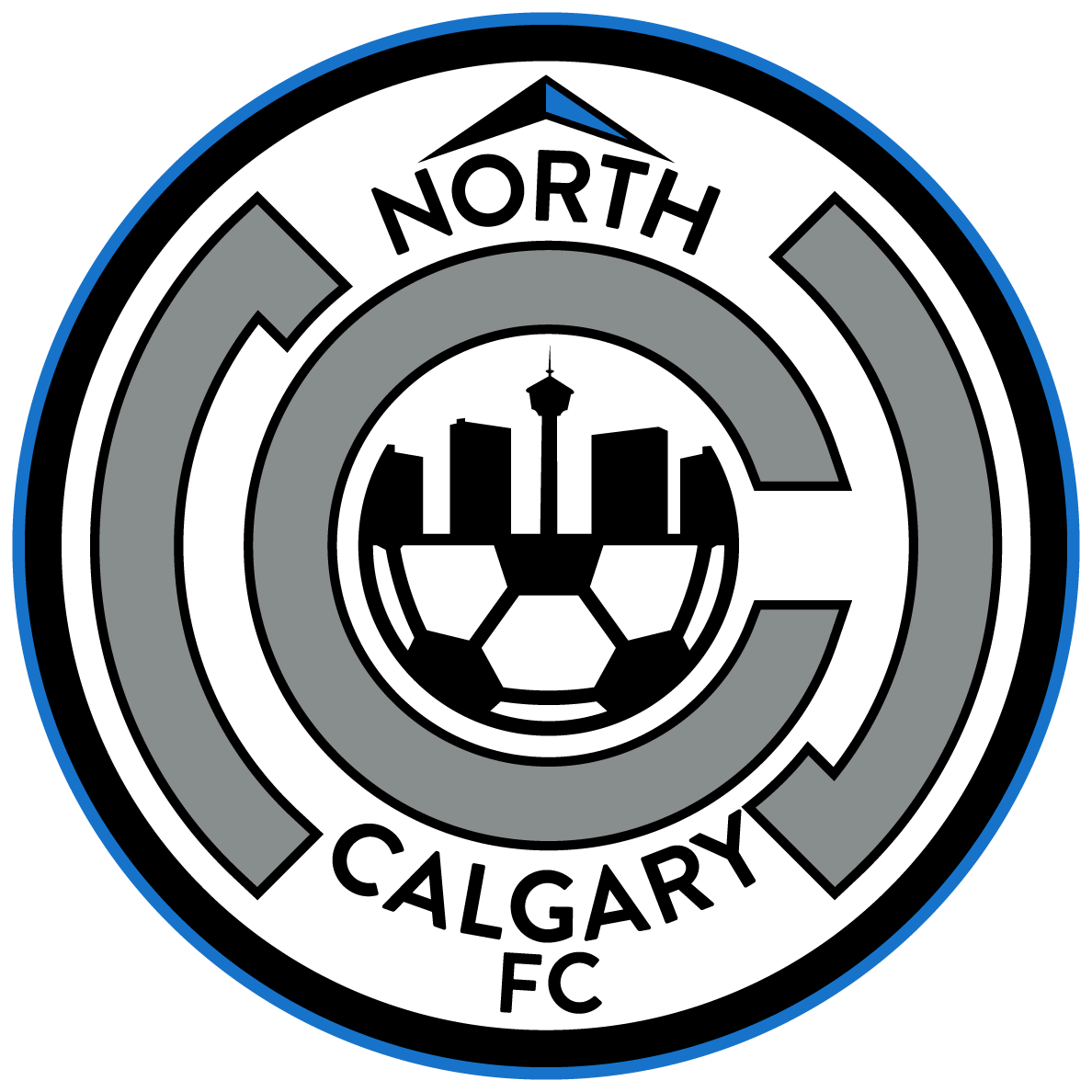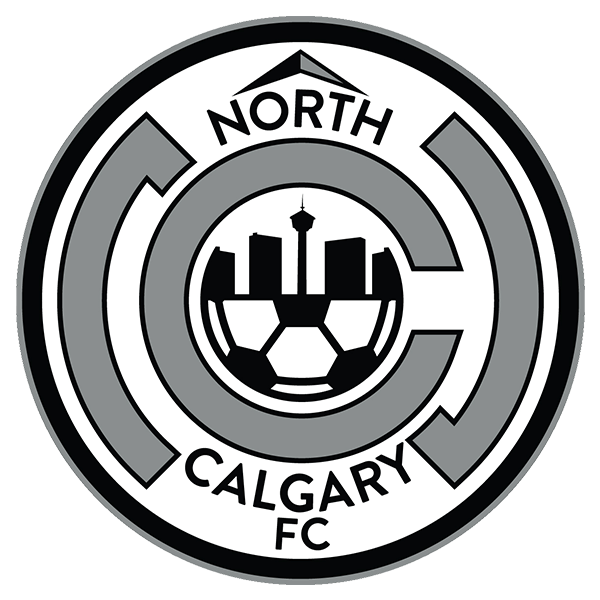TABLE OF CONTENTS
As the club is constantly growing and evolving, items within this guide are subject to change.
Additionally, Calgary Minor Soccer Association (CMSA), Alberta Soccer Association (ASA), Canada Soccer Association (CSA) and the International Football Association Board (IFAB) are responsible for making and updating policies and rules related to soccer and all resources that they may issue take precedence over anything stated in this guide.
WHO TO CONTACT IN THE CLUB
VOLUNTEERING
ASSISTANT COACH: The assistant coach is responsible for helping the coach with all on-field responsibilities of the team. The assistant coach should be present at all games and practices if possible, and will assist the coach in running practice drills and game management. Most teams will have one or two assistant coaches. Teams must have a minimum of two and a maximum of four officials on the bench for a game.
MANAGER: The manager is responsible for all off-field responsibilities of the team. The manager should ensure all parents have a schedule of team practices and games, and should be the point of contact with other teams and CMSA for any re-scheduled games. The manager oftentimes plays a role in tracking the jerseys assigned to each player, and determining attendance for each game and practice. As per NCFC club policy, the team manager should not be related to the head coach.
(not eligible for refund, but are required)
BENCH PARENT: Inclusive of the roles listed above, all teams must ensure that there is one parent of the same gender as the team present at all games, practices, and team events. If the coach and assistant coaches are all of an opposite gender to the players they are coaching, then a designated bench parent must be assigned for all games, practices, and team events.
FIELD MARSHALL: Please see the Field Marshall section of this guide.
SAFETY ADVOCATE: All teams registered in CMSA must have a parent or coach who volunteers as safety advocate for each game. Their duties are outlined in the CMSA Concussion Policy, which can be found at the following link: CMSA SAFETY ADVOCATE DUTIES (PDF)
OTHER ROLES: Teams may also choose to assign parents to other volunteer roles for their team. Examples of other roles could include a tournament coordinator or a fundraising coordinator if needed.
CMSA COACHES, MANAGERS AND ADMIN INFORMATION
CMSA is committed to creating a positive soccer experience for all and requires two (2) team officials on each CMSA roster to complete the Respect in Sport program.
The cost to certify in the program is $30.00 and will be valid for 5 years. NCFC will reimburse you for this fee. Please contact Coaching for more info.
The CMSA Program Calendar & League Structure can be found at the following link: CMSA CALENDAR & LEAGUE STRUCTURE
GAME SHEETS
At the end of the game the referee will take 4 copies of the game sheet (2 of the home team’s game sheets and 2 of the away team’s game sheet) and each team will receive a copy of the other team’s game sheet. When the game sheets are returned by the referee please ensure you also receive your player/coach ID cards back (Unless the player or coach has been sent off, in which case the referee will keep the card). If a team does not bring any copies of their game sheets to a game, they will be forced to hand write their team’s appropriate information on the opponent’s game sheet and the referee will notify CMSA that no game sheets were provided. After the game, it is the responsibility of the winning team to report the scores in Goalline within 24 hours. In the event of a tie, it is the responsibility of the home team to report the scores in Goalline within 24 hours.
SAMPLE GAME SHEET
REFEREE NO SHOW
Coaches/TMs responsible to ensure all registered roster players have completed the CMSA waiver, in possession of a valid CMSA ID card (U11 and up), or other player requirements. Contact CMSA office for assistance.
Please use the links below for CMSA’s guide for printing game sheets and submitting scores through the Goalline Portal.
Goalline Administration - How to
Goalline Mobile Guide
The full procedure a team must follow when there is no referee present for a game can be found in the CMSA Rules and Regulations: CMSA RULES & REGULATIONS
Some important points regarding the policy:
- The game must be played as scheduled, so each team must agree on an appropriate replacement If no official can be agreed upon, then the teams can each provide a referee for one half of the game.
- Any delay in the start time must be accounted for by shortening the length of each half as the game must start and end on
- Both coaches, along with the replacement referee(s), must sign the game sheet before the game begins.
- Once the game has commenced CMSA will determine that both teams have conclusively agreed upon and accepted the replacement
- At the conclusion of the game, the game sheets must be immediately submitted to CMSA. These can be submitted in person at the CMSA drop box locations, or scanned and emailed to CMSA immediately following the game, with the physical game sheets dropped off at a CMSA dropbox location on a later date.
CMSA GAME FEEDBACK
The CMSA Game Feedback form can be found at the following link: CSMA GAME FEEDBACK FORM
This form is to be used to report any player behaviour, coach behaviour, spectator behaviour, or field conditions that the team believes CMSA should be made aware of. All sections of the form must be filled out, and it should be received by CMSA within 48 hours of the incident occurring. Any disputes with an opposing team should be handled through this channel.
Any disputes regarding the final outcome of a game must first be reported to the NCFC Board of Directors. The Board will then decide whether to forward the issue on to CMSA. CMSA must receive these protests within 48 hours of the game in question. All protests must be accompanied by a $250 administrative fee.
Any feedback on a referee’s performance can be submitted to CMSA using the Referee Evaluation Form:
CSMA REFEREE ONLINE EVALUATION
This feedback can be both positive or negative, as CMSA takes this feedback into account when assigning games to referees.
FIELD MARSHALL GUIDE
- Before each game, select a parent or spectator who will be the designated Field Marshall for your team for that game. This individual cannot be a coach or bench parent. Teams can have one individual who will act as Field Marshall for all the games in a season, or the role can be split among different parents for each game. Ensure the individual chosen is given the orange Field Marshall armband for that game.
- Ensure the individual selected to be the Field Marshall is someone who will remain calm throughout the game, and someone who will be comfortable pointing out and attempting to correct any unacceptable behaviour on the sidelines.
- Print this individual’s name on the game sheet in the Field Marshall section, and have them sign beside their name. This is extremely important, as any teams without a Field Marshall identified on the game sheet will face a fine from CMSA.
- When acting as the designated Field Marshall you must wear the orange Field Marshall armband for the duration of the game. The band must be visible, so ensure to put it on overtop of any jackets or sweaters.
- The Field Marshall is to support the referee throughout the game, so it is not appropriate for the Field Marshall to make negative or unsporting comments towards any of the officials, players, or spectators.
- The Field Marshall is expected to address any potential problems that may arise on the sidelines. Some strategies include outlining expectations with parents before the game starts, and calmly speaking with any individuals involved in any incidents during the game.
- The Field Marshall should not put themselves in a position that will compromise their safety. Any serious incidents should be reported to CMSA immediately.
ASSISTANT REFEREE GUIDE
COACHES / OFFICIALS
- Before each game choose an AR that is physically able to keep up with the pace of play at your Ensure this AR is at the pitch 15 minutes before the game is to begin so they can have a conversation with the referee about their expectations and to ask any questions the AR may have. The referee has the final decision as to what they expect the AR to call.
- Ensure the AR chosen will be unbiased and will not ‘coach’ or talk to the players from the sidelines while they are acting as the AR. Once the AR has met with the referee they are now a member of the refereeing team and are expected to act in a professional and unbiased manner.
The ball is considered out of play when the whole of the ball has passed over the goal line or the touch line on the ground or in the air.
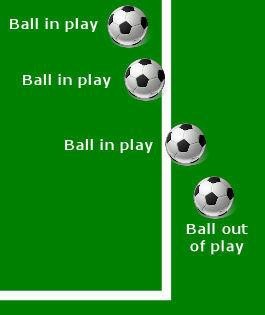
ASSISTANT REFEREE SIGNALS
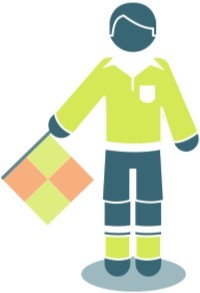
GOAL KICK
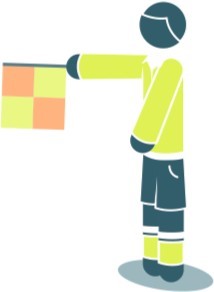
SUBSTITUTION

THROW IN
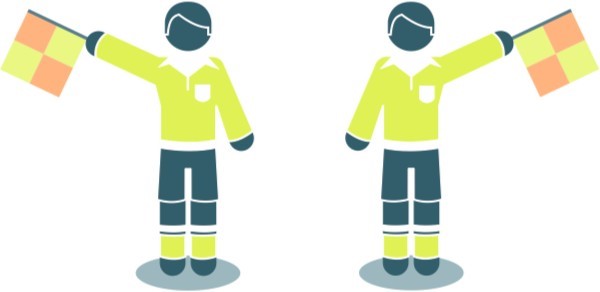
OFFSIDE
FIRST SIGNAL
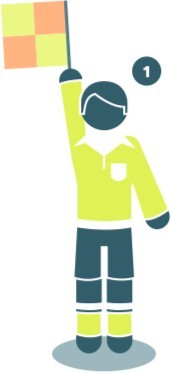
THEN SIGNAL WHERE THE OFFSIDE OCCURRED
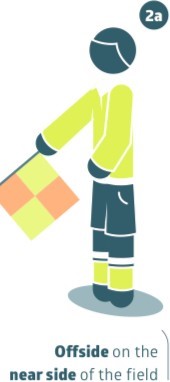
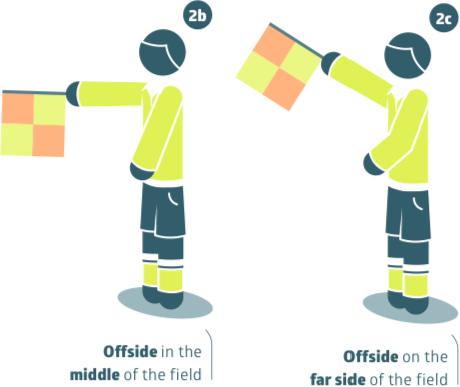
- There are two aspects of Offside, an offside position and an offside offence
- Offside Position
- A player with any part of the body that can play the ball (Head, feet, legs, body) in the opponent’s half that is nearer to the goal line than the ball and the second last opponent
- The hands/arms of the player are not considered when determining if the player is in an offside position
- The AR needs only to be aware of players in an offside position and no further action is required
- Offside Offence
- If a player in an offside position becomes involved in play they commit an offside offence
- A player becomes involved in play by:
- Interfering with play by playing/touching a ball that was passed/touched by a teammate
- Preventing an opponent from playing or being able to play the ball by obstructing the opponent or their vision (ex: screening the keeper)
- Challenging an opponent for the ball
- Attempting to play a ball that is close to them
- Making an obvious action that impacts the ability of an opponent to play the ball
- Gaining an advantage by playing the ball when it has been deflected off of an opponent or deliberately saved from crossing the goal line by an opponent
- A player does not commit an offside offence if the ball is played directly to them by an opponent; this does not include deflections
- There are no offsides on goal kicks, throw-ins and corner kicks
- If a player commits an offside offence the AR is to run in line with where the offence occurred, raise their flag straight up and then point the flag to the portion of the field in which the offence occurred
- The referee may signal the AR to lower their flag; if so, continue as if no offside had occurred
- The AR is to remain on the on the same half of the field as their own team’s defenders through both halves of the game
- The AR is not to cross the centre line
- The AR should remain in line with either the ball or the second last defender, whichever is closer to the goal
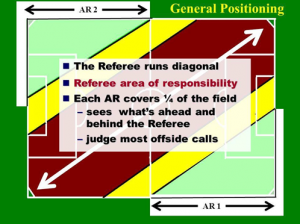
- U10 and Below
- No offsides
- U11 and U12
- The offside rule is applied as above except a player can only be in an offside position in the last third of the field
GAME RESCHEDULING
A few important notes:
Rescheduling games due to inclement weather or field closure:
If a game is cancelled because the field is closed, the home team must complete and submit the rescheduling form found at the above link.
For all teams U9-U12, the home team must contact the away team and set up a new date, time, and location which the away team agrees to. The rescheduling form must be submitted to CMSA at least three days prior to the newly arranged game date.
For all teams U13 and above, the home team must fill out and submit the rescheduling form and CMSA will schedule the new date, time, and location. This form must be submitted to CMSA within 48 hours of the originally scheduled game.
Rescheduling games due to other requests (U13 and above):
Games cannot be rescheduled on the basis of a player or coach being unavailable on a certain date. The only valid reason for requesting a reschedule is if the team is participating in a tournament at the same time as a regularly scheduled game.
The team requesting the reschedule must email rescheduling@calgaryminorsoccer.com with their reason for requesting a reschedule. If CMSA accepts this request, the team can then contact their scheduled opponents and determine a new date, time, and location their opponent agrees to.
The team requesting the reschedule must fully complete the game rescheduling form and submit it to CMSA at least five days prior to the originally scheduled game and newly agreed upon reschedule date. The team requesting the reschedule will be charged a $3o rescheduling fee by CMSA and will also have to cover the cost of the field for the newly rescheduled game.
FUNDRAISING
Fundraising allows all players the chance to participate in these events and are often excellent team building activities away from the field. There are many options for fundraising, we have outlined a few common ones below:
Bottle drives can be very lucrative and don’t require too much time. Pick a neighbourhood you don’t think has had a recent bottle drive then advertise in advance.
Teams can feel free to look at a variety of other fundraising activities. Research any proposals you may have and ensure that they fall within the rules set out by the AGLC and other government regulations.
Teams must then reach out to the club at info@northcalgaryfc.com to get club approval or suggestions on your team fundraising events.
